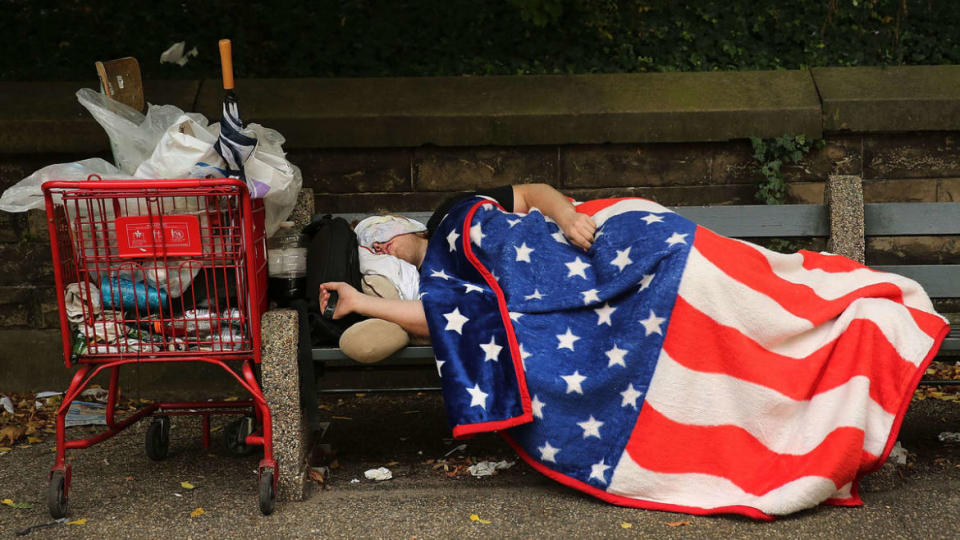Homelessness Just Keeps Getting Worse. Here’s How to Help.

Homelessness in America was already a massive crisis before the COVID-19 pandemic and the past two years have made the situation even worse. With evictions now rising after the end of a federal moratorium and an ongoing lack of affordable housing, more and more individuals and families are facing a desperate and dehumanizing situation. Here are some charities around the country that provide an opportunity to give a helping hand to those facing housing insecurity and homelessness.
HUMANIZE HOMELESSNESS
Part of the problem is the dehumanization of homeless people, making it easy for passersby to simply turn their heads—out of sight, out of mind. This is where the NGO ‘Humanize Homelessness’ comes in. This all-volunteer organization based in Washington state is dedicated to helping folks who are less fortunate to create a “kinder, more supportive, and more successful society for all of us.” The organization’s self-proclaimed vision is to “humanize the people experiencing homelessness” through programs like employment mentoring and “Know Your Neighbor” visits to family shelters, and its mission is to “make it easier to help the homeless.”
MICHIGAN COALITION AGAINST HOMELESSNESS
Addressing the issue of homelessness from a political standpoint is a bureaucratic, byzantine process, which the nonprofit Michigan Coalition Against Homelessness (MCAH) tackles head-on. MCAH works to prevent and end homelessness in Michigan by empowering over 560 Michigan homeless service agencies through “public awareness activities, advocacy at the state and federal level, and support services that bring in national expertise and best practices” using primary and secondary research to do so. The nonprofit is dedicated to addressing the infrastructure and systemic change needed to make change for homeless folks.
NEW ORLEANS WOMEN & CHILDREN’S SHELTER
One homeless person is one too many, but the most vulnerable and under-served are homeless families—women and children in particular. The New Orleans Women and Children’s Shelter opened immediately after Hurricane Katrina due to an urgent need for food, shelter, and security. But they go further than providing shelter and meals at no cost to families; they follow through with those who leave the shelter for at least 18 months afterward with children’s programs, workforce development programs, financial literacy, and more. This organization is dedicated to helping families from diverse backgrounds, including pregnant women and single-father-led families, “to transition from a life of homelessness and poverty to one of stability and self-sufficiency.” The shelter is open 24/7 and consistently operates at 90 percent capacity or higher.
NATIONAL ALLIANCE TO END HOMELESSNESS
State and local programs to help end homelessness are vital—but so are federal ones. Our leaders in Washington need to address this crisis through policy change and enacting legislation at the national level. One organization that tackles this fundamental issue is the nonpartisan non-profit National Alliance to End Homelessness. Using data-driven research, the Alliance gives policymakers the necessary information to understand what programs actually work to reduce homelessness, and provides training to public agencies. Recent studies include a look at the importance of ongoing rent relief and eviction assistance, racial disparities in homelessness, and how transgendered individuals are among the most vulnerable homeless populations.
BOWERY RESIDENTS’ COMMITTEE
New York’s Bowery Residents’ Committee not only provides immediate help to those in need but also addresses the underlying, systemic problems that feed the cycle of homelessness. BRC helps those who suffer from severe physical and mental illnesses, including drug and alcohol addiction, and has special services for vulnerable elders. Their transitional housing programs offer fresh meals, clean showers, and employment services, and they also help people move into permanent housing with a sliding scale of affordable rent.
ROSIE’S PLACE
Even when immediate survival needs are met, underserved folks need self-care too. That’s where Rosie’s Place comes in. Rosie’s Place was the first-ever shelter for women in the country to offer more than just emergency shelter, meals, and food pantries. They also provide ESOL (English to Speakers of Other Languages) classes, legal assistance, wellness care, one-on-one support, housing, and job search services, and community outreach. Rosie’s Place is also a safe haven for LGBTQIA+ people who self-identify as female. Their mission “is to provide a safe and nurturing environment that helps poor and homeless women maintain their dignity, seek opportunity, and find security in their lives.”
Get our top stories in your inbox every day. Sign up now!
Daily Beast Membership: Beast Inside goes deeper on the stories that matter to you. Learn more.

 Yahoo Finance
Yahoo Finance 